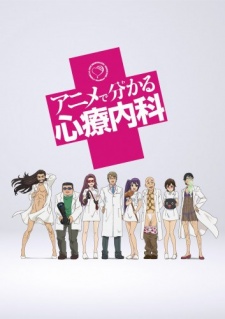
A quick Google search of the words “mental illness comedy” gives a pretty good indication of why psychosomatic issues are trivialized—and highly patronized—amidst a society finally starting to realize that the invisible illnesses of the mind are as tangible and harmful as any physical disability, no matter how temporary they may be. But like psychosomatic issues themselves, comedies about such conditions work on a spectrum, starting on one end with One Flew Over the Cuckoo’s Nest, which stigmatized mental wards and made light of brain-related illness in a way that still has yet to fully loosen its grip on society today, and stretching to Kuuchuu Buranko, which went the distance to cure the patients involved. And somewhere in the middle is the tsukkomi-based infomercial on speed that is Comical Psychosomatic Medicine. Yes, it takes on the most common mental issues everyday people run into and gives easy-to-understand advice on taking back your daily life. Yes, there is a lack of seeing that daily life run amuck, seeing the suffering of actually living with depression, anxiety, and other disorders. Yes, it is still both useful and absolutely hilarious.
Because the point of Comical Psychosomatic Medicine isn’t really to understand what suffering from a psychosomatic illness is like; its purpose is to suggest a cure with a smile on its face, and to help people solve issues by starting with laughter. Each episode takes on a new illness, following a simple pattern of discussing the illness, suggesting what victims can do personally to make their lives more tolerable, and ending with a suggestion to visit a local mental clinic. It even goes the mile at the very end by showing what going to the mental clinic—a place of fairly ill repute—really looks like, sliding in plenty of jokes about how ordinary and accessible the process is along the way. The choice of fast-paced boke-tsukkomi humor keeps us pulled out of the characters and the setting, which was presumably chosen to be as plain as any show could afford, and so all we have left to do is laugh and soak in the lessons as they come.
It isn’t that the characters are unnoteworthy. Far from it; between a nudist, a masochist, a few perverts, and three busty nurses to parody the anime industry’s female archetypes, not much is left to the imagination. The lessons can stick because these characters are archetypes and not human beings, and as stigmatizing as it should be to take the human face away from psychosomatic illness, that's precisely what is needed for the abstract lessons of dealing with feelings, notoriously hard to describe themselves, to stick. And when one of the more important issues they deal with week after week is the effect of getting stuck in the same mental rut, unable to break free, it makes sense that the lesson would come as a ridiculous comedy and not as a serious affair. On the spectrum of psychosomatic comedies, it is the farthest away a show can be from painting mental issues in a real human manner. And yet by doing so it manages to be a lot more useful for helping real humans than most dramas are.